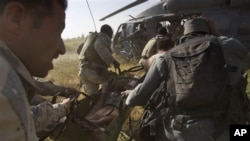The commander of the Pentagon's special unit that tries to counter roadside bombs in Iraq and Afghanistan says technology is helping, and more is on the way, but the most effective way to find the bombs before they explode continues to be the most dangerous -- a simple foot patrol.
The problem started in Iraq and has now moved to Afghanistan. Insurgents plant bombs, often simple, homemade ones, near or under roads and detonate them when troops pass by. The military calls them Improvised Explosive Devices, or IEDs, and they have become the biggest killer of U.S. troops in the two wars.
The U.S. government has spent nearly $17 billion trying to defeat IEDs, partly by developing a variety of high-technology solutions including jammers to block remote detonation signals, various types of detectors to sense the presence of metal and other IED components, better armored vehicles and unmanned aircraft with sophisticated cameras to watch the roads and the insurgents.
The Director of the Pentagon's Joint IED Defeat Organization, Lieutenant General Michael Oates, says all that has had an impact, saving an unknown but significant number of lives. But he says improved training for U.S., Iraqi, Afghan and allied troops has been equally important. "Today, as I sit here with you, the majority of IEDs are still found by very well-trained soldiers in partnership with their host-nation force, using a dog," he said.
The general says that is particularly true in Afghanistan. He says IEDs in Iraq became so technologically sophisticated that they were susceptible to the U.S. military's high-technology countermeasures. But he says in Afghanistan, like in the early years in Iraq, the bombs are much simpler, containing little or no metal and detonated by pressure rather than remote signals. He says that makes them more difficult to detect.
"Afghanistan currently presents a homemade explosive, low-technology threat to us. This one (this threat), the one in Afghanistan, presents very unique challenges to high tech," he said.
General Oates says he has not seen many of the more sophisticated military-grade bombs in Afghanistan, like the ones Iran provided to Iraqi Shiite insurgents. But the simple Afghan bombs are still deadly, and the military has not been able to increase the number of roadside bombs it finds before they go off in either Afghanistan or Iraq beyond the 50% rate it achieved several years ago.
Still, he says, technology has a role in his effort in Afghanistan, and his unit is working to develop better hand-held detectors for the troops so they can find the bombs before they get so close that they are in danger, and new unmanned helicopters to watch key areas for extended periods.
He also says fighting the insurgent networks is the "main effort" of his organization. His unit does that through intelligence gathering, surveillance and interrupting supply lines and financing streams.
But General Oates says, as with the broader conflict in Afghanistan, there is no purely military solution to the problem of insurgent bombs. Indeed, he says along with training the Afghan and allied troops and targeting insurgent leaders, the most effective ways to fight Afghanistan's roadside bombs are the same methods that are being used to try to win the war -- protecting the population, providing government services and economic development and working toward reconciliation with insurgents who are willing to re-, join society.
"If you don't work to mitigate the recruitment and the enticement for emplacement of IEDs, you will spend an enormous amount of blood and treasure dealing with each individual IED that is put against you. It is not a winnable project just to kill emplacers or to just uncover the device," he said.
General Oates says he believes the combination of counter-IED training and technology, along with broader counterinsurgency efforts and the beginnings of reconciliation will avoid the spike in IED attacks next spring that has been seen in each of the last two years. But he also notes that insurgents adapt to everything U.S., Afghan and allied forces try to do.
The general, who has led the Pentagon's counter-IED unit only since last year, also pledged more focus and transparency in the group's work. Reports by the Government Accountability Office have criticized the huge organization, which was quickly put together in 2006, for being disorganized, wasteful and ineffective in some of its efforts.
Simple, Deadly Afghan Bombs Frustrate High-Tech US Solutions




